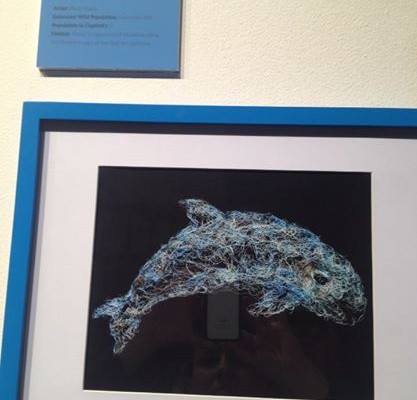By Peggy Turk-Boyer, Executive Director – cedointercultural.org
This Saturday, July 9th, people from around the world will be joining together to recognize vaquita, the shy and tiny porpoise that only lives in the northernmost reaches of the Gulf of California, CEDO’s back yard. It will be hard to celebrate on this 2016 “International Save the Vaquita Day”, as this day comes on the heels of some very bad news for vaquita. This past May experts from


CIRVA, an International Committee for the Recuperation of the Vaquita, reviewed the most recent evidence and actions that have been implemented on vaquita’s behalf and issued various
recommendations. The sad news is that they now estimate the vaquita population to be less than 60 animals, with a 92% decline since the first estimate was done in 1997.
The primary cause of this decline is the illegal totoaba fishery. Three dead vaquitas were found near San Felipe this spring with clear evidence that all three of them drowned in totoaba nets. Despite increased enforcement and the complete ban of all gillnets, with the only exception for the corvina fishery, fishermen find a way to capture totoaba. The temptation is great: the Chinese black market pays up to $15,000 US per kilo for the swim bladder. Fishermen go out in the dead of the night, willing to take whatever risk is necessary.
Given this circumstance CIRVA has now recommended a ban on the corvina fishery. The corvina migrates to the Colorado delta to spawn during spring months, similar to the totoaba. Fishermen encircle the schooling fish with their nets in such a way that does not pose any threat to vaquita. Nonethless, many believe that by allowing these gillnets in the region for this fishery, it makes it easier for fishermen to sneak in with totoaba nets, hence the recommendation to ban this fishery. Fishermen are very unhappy about this new recommendation, but the government seems inclined to follow it, as was evidenced when they did not approve fishermen’s impact studies for this fishery.

The primary solution being offered is to put energy and resources into finding alternative gear. In April CEDO participated in a workshop convened by INAPESCA and WWF with world experts on gear and bycatch. Workshop participants devised a plan to test many kinds of gear, beginning this fall. INAPESCA will be in charge of implementing this plan and has asked CEDO’s help in motivating fishermen to participate in trials and to make the needed changes.
Fishermen hope that the gillnet ban is temporary, but CIRVA’s recommendation is that this become a permanent ban. Alternatives are needed to support the livelihood of the communities of the region. Fishing can become a sustainable activity, but innovative ways are needed to fish so that vaquita and other incidental catch is eliminated. Market incentives can help motivate fishermen to change and may be the last hope for the vaquita.

Please join with CEDO and others to commemorate vaquita. From our first encounters with vaquita on the beaches of Puerto Peñasco in the 1980s, CEDO has been engaged in trying to understand this porpoise and involve local communities in its protection. As I reflect on many years and many diverse efforts, one thing is clear – it takes a village. The many actors that use, govern, study and care about the northern Gulf ecosystem and its resources have to come together to protect this critically endangered porpoise, and all of these efforts must be going in the same direction, at the same time, to be successful. As we come to this turning point, this crisis, perhaps the urgency of the situation will bring us together to save this animal, so near and dear to all of our hearts at CEDO and beyond. In the global world we live in today your help is needed too.
